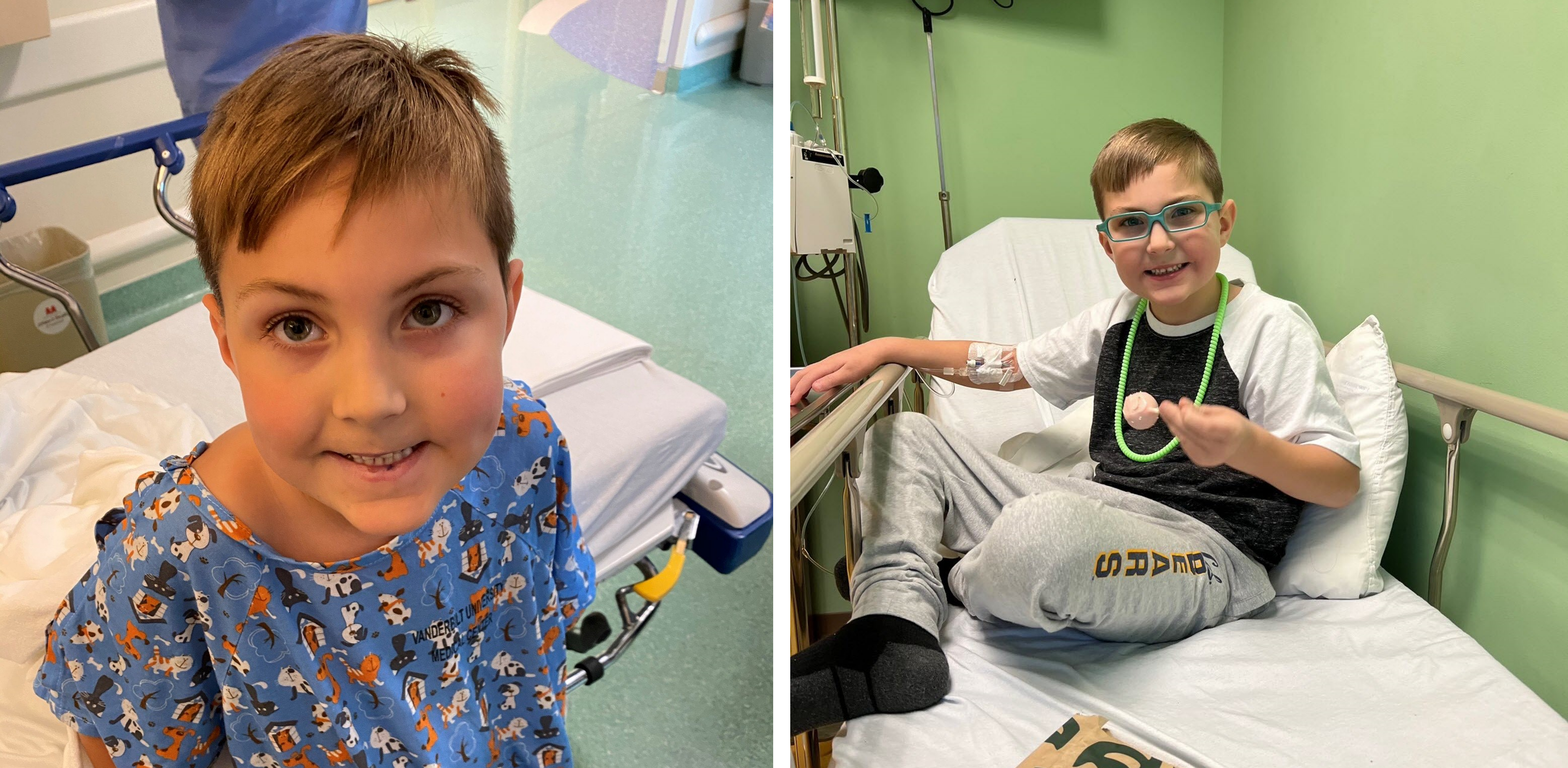PANDAS stands for “pediatric autoimmune neuropsychiatric disorders associated with streptococcal infections,” which describes a group of conditions thought to affect certain children who have had strep infections. In PANDAS, the child’s immune system produces antibodies to fight the bacteria that caused the strep infection, but the antibodies mistakenly attack healthy cells in other tissues because they mimic those of the strep infection. Antibodies are thought to affect brain tissue and trigger inflammation, causing a sudden and dramatic onset of psychological and neurological symptoms.
According to the PANDAS network, one in 200 children in the United States alone have PANDAS. Unfortunately, many children go untreated, sometimes experiencing debilitating symptoms for years until finding the cause.
This was the case for eight-year-old Wayne Ferrell, until he met Zachary Hoy, M.D., pediatric infectious disease specialist and practice medical director at Pediatrix® Infectious Disease of Nashville. After two years of suffering from unexplained symptoms, the family finally received the diagnosis and treatment they were so desperately seeking.
Daily Living Challenges
Now adopted, Wayne came to mom Lisa as a foster child with a complex medical background. She learned he had many differences, including sensory needs. In time, he was found to be on the autism spectrum and have attention-deficit/hyperactivity disorder.
Wayne had severely red cheeks, was unable to eat or sleep, said the same things repeatedly and had very aggressive and extremely hyper behavior.
“We weren’t able to figure it out for the longest time,” said Lisa. “I kept taking him back to his pediatrician and saying, ‘something is not right.’”
Eventually, the pediatrician and occupational therapist suggested strep. While he never had any outward symptoms of an infection, Wayne doesn’t express pain in a typical way due to his other conditions. This ultimately complicated and slowed the process of reaching a diagnosis. After consultation with a neurologist, he was referred to Dr. Hoy, “who started turning this large ship around for us,” said Lisa.
During evaluation, it was clear to Dr. Hoy that Wayne’s distressing symptoms were negatively hindering his activities of daily living, which is commonly seen in PANDAS.
“It starts knocking you out of your average daily functioning, which is going to your ‘job,’” he said. “Your ‘job’ is school. Can you go to school — meaning you don’t have any problems getting dropped off because separation anxiety is a big part of this — stay in school and get along with your peers and teachers? Sometimes it’s a lot to go through at school so you build up your anxiety and then when you get home, you have to kind of let out that stress and anxiety. So, it was affecting all aspects of life, school and home.”
The Path to Diagnosis
Diagnosing PANDAS is often a gray area. There isn’t a specific test for it, so a pattern of symptoms must be established. And because Wayne’s case wasn’t a typical strep infection, the process was that much more difficult.
“There are background symptoms and there is a flare pattern, so it can be in cycles or associated with anything that puts stress on the body,” said Dr. Hoy. “We try to figure out what that pattern is and what triggers these flares of symptoms.”
A battery of lab tests is run, looking at strep and mycoplasma markers, and the immune system is tested to rule out processing disorders. Based on the testing, an antibiotic prophylaxis trial is then administered using three different antibiotics that work in different ways. Each antibiotic trial is eight weeks. If a child fails those three classes of antibiotics, like Wayne did, they can then proceed with intravenous immunoglobulin (IVIG) therapy.
IVIG is an intravenous pooled blood product comprising immunoglobulins that prevents the body from attacking itself and decreases inflammation. It is one of the most effective treatment options for immune deficiencies like PANDAS.
“Research shows that in PANDAS, the body makes some mistake antibodies or too many antibodies, and when it’s exposed to strep or these other triggers, it causes symptoms,” said Dr. Hoy. “The way that IVIG works is it acts like a sponge to take out extra antibodies.”

Transformative Treatment
Since beginning IVIG therapy, Wayne has made a complete turnaround. “We’ve spent going on three years with Dr. Hoy, receiving infusions and regular care, and have seen significant improvement,” said Lisa.
Wayne’s sleep is more relaxed. “He used to pull his eyelashes out in his sleep or bang his head,” said Lisa. “He doesn’t do that anymore. He’s sleeping much better.”
His separation anxiety has eased. “The separation anxiety is different for Wayne because of his other needs, but one of the things he used to say is ‘I want my mom’ over and over,” said Lisa. “We don’t have that anymore.”
Wayne’s motor skills have also improved. “After the first infusion, Wayne drew his very first picture that I could make out what it was,” said Lisa. “Now he can write and draw, which is one of the first things that goes away when he’s inflamed.”
This remarkable progress has directly impacted Wayne’s schooling. “He’s able to go to school all day every day and have the stamina to push through even if he’s struggling with inflammation in some area, whereas before Wayne’s behaviors from PANDAS were not conducive to previous school environments,” said Lisa. “He can think more clearly to be able to learn at school when things are level.”

Wayne’s “Best Life”
Perhaps one of the most significant changes for Wayne is that he now has more insight into his condition and can communicate the symptoms he’s experiencing.
“For a chronic diagnosis, when a patient understands when they’re having a flare of symptoms, they can at least describe that they’re feeling different and then their parents can help explain that’s what strep is and they start to recognize what it means,” said Dr. Hoy.
Wayne will now say he’s “feeling streppy” and mom immediately knows that something is going on. “That’s big because if he can identify the symptoms earlier, you can treat and intervene, so they don’t get to a major flare of symptoms,” said Dr. Hoy
“It’s changed his life completely,” said Lisa. “I’m so thankful that our crises have been so far and fewer between since starting the infusions, and to see Wayne succeed in learning, making friends and enjoying life.”
“Wayne’s had some really tough days but on average he’s now having a lot better days and more consistently,” said Dr. Hoy. “It’s a process but in sticking with it, we’ve gotten Wayne to a better point and I’m glad to see it.”

Learn more about our pediatric services or find care in your area.
